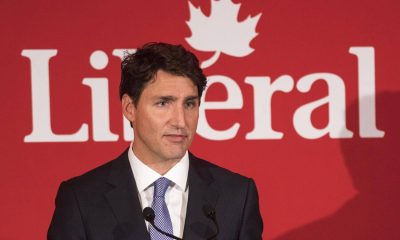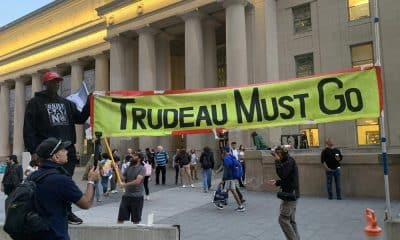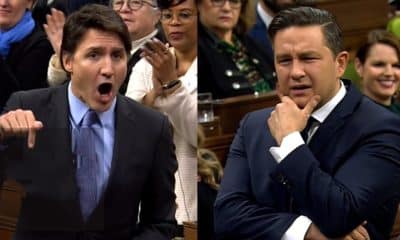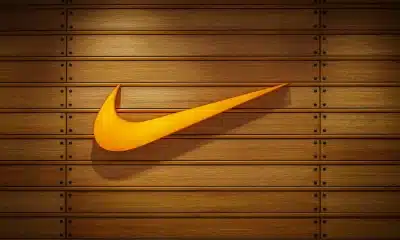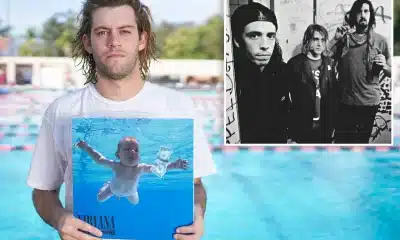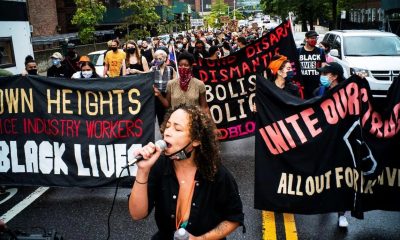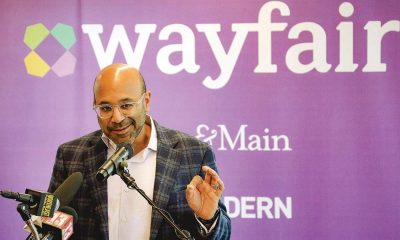Politics
New York Times Op-ed Slams Canada’s Justin Trudeau

Political careers often end in failure — a cliché that exists because it too often happens to be true. Justin Trudeau, one of the world’s great progressive leaders, may be heading toward that moment. In a recent interview he acknowledged that every day he considers leaving his “crazy job” as Canada’s prime minister. Increasingly, the question is not if he will leave but how soon and how deep his failure will be when he goes.
At stake is something that matters more than one politician’s career: Canada’s contemporary liberal and multicultural society, which just happens to be the legacy of the prime minister’s father and predecessor, Pierre Trudeau. When you fly into Montreal, you land in Trudeau airport, and that’s because of Pierre, not Justin.
The threat to that liberal tradition is not all Justin Trudeau’s fault, of course. The right-wing tide overwhelming global politics has come late but with pent-up vigor to Canada. For several years now, polls have shown Mr. Trudeau’s Liberals at lows from which no Canadian political party has ever recovered in elections. In a recent by-election, in a key suburban district of the Greater Toronto Area, the Conservative Party beat the Liberals by a lopsided 57 percent to 22 percent, a swing of nine percentage points to the Conservatives.
But polls and by-elections can be poor predictors of election viability. A better indicator is the flummoxed figure of Mr. Trudeau himself, who seems increasingly out of touch in the new world of division and extremism.
Part of Justine Trudeau’s problem is simple exhaustion, both his own and Canadian voters’. He has been in government for almost eight and a half years. During that time, he has been one of the most effective progressive leaders in the world. His government cut Canada’s child poverty in half. He legalized marijuana, ending roughly 100 years of nonsense. He made large strides in reconciliation with Indigenous Canadians. He renegotiated NAFTA with a lunatic American president. He handled Covid better than most. You don’t have to squint too hard to recognize that he is one of the most competent and transformative prime ministers this country has ever produced.
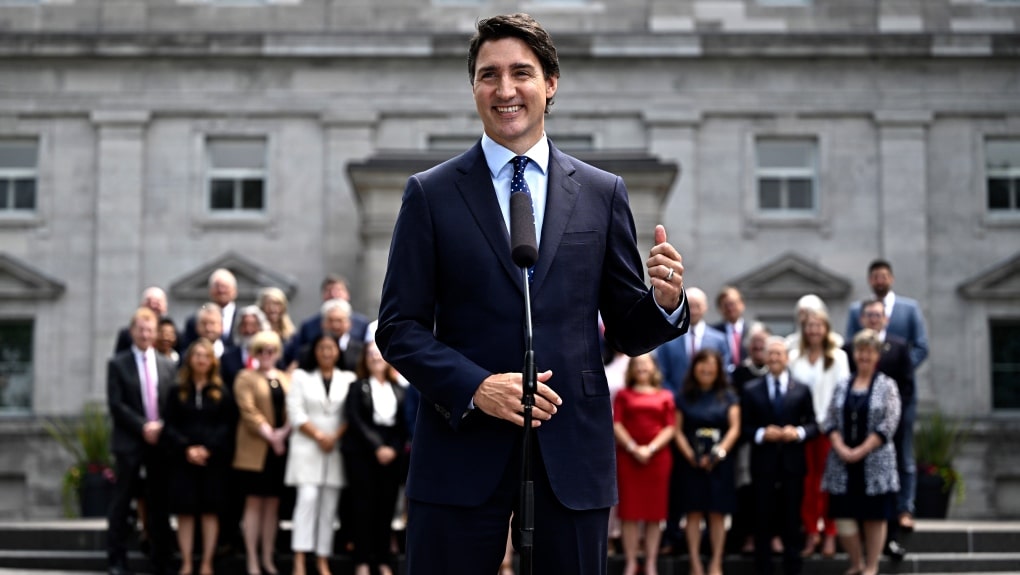
Justin Trudeau talks to media in 2015: File Image
But an era has passed since the start of that halcyon time, when Mr. Trudeau stood in front of his first cabinet and, when asked why it was half female, answered, “Because it’s 2015.” Now a new generation has emerged, for which the liberal technocratic order his government represents has failed to offer a path to a stable, prosperous future and the identity politics he once embodied have withered into vacuous schism. The growing anti-Liberal Party sentiment of young people is the biggest threat to his electability.
His opponents are well aware of Mr. Trudeau’s unpopularity with young voters and have focused Conservative attacks on an issue especially important to that cohort: the housing crisis. The soaring real estate market, in which tiny homes in Toronto and Vancouver now regularly cost more than properties in Paris or New York, has been exacerbated by the Trudeau government bringing in over a million immigrants last year without having built the necessary infrastructure to support the communities receiving them.
For decades, Canada has been the only country in the world where the more patriotic citizens are, the more they support immigration. Liberal mishandling of immigration’s impact may well end this blessed state. The housing crisis is the epitome of Mr. Trudeau’s failure: It feels good — it feels righteous — to support immigration. Isn’t that the whole idea behind multiculturalism? But without the proper hardheadedness, without being frank about difficult realities, righteousness quickly sours.
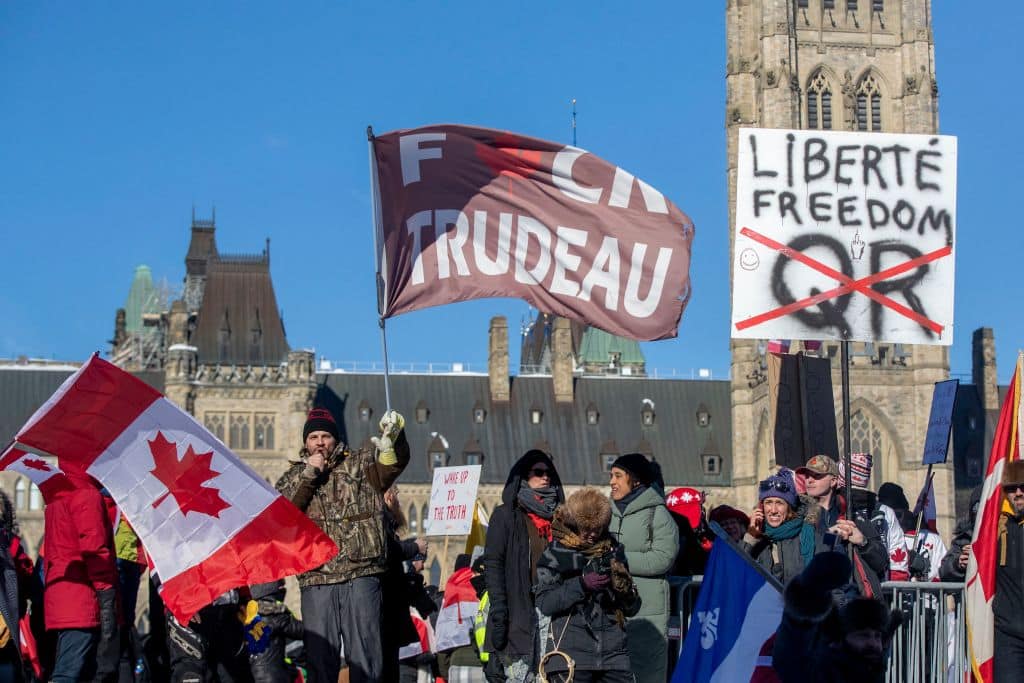
“Freedom Convoy” of some 2,700 trucks protest: CBC Image
The first evidence of the prime minister’s weakness in the face of Canada’s growing polarization was the government response to the so-called Freedom Convoy in 2022, in which anti-vaccine demonstrators held Ottawa hostage for a month. His government decided to take a bureaucratic approach to the disruption, dithering while the truckers entrenched themselves in the city, then using the Emergencies Act to seize several of their bank accounts. A January federal decision found that Mr. Trudeau’s invocation of the act was “not justified.”
Other countries took much simpler approaches to their civil unrest in the aftermath of Covid restrictions. The French used tear gas. The moment a convoy set out from Los Angeles headed for Washington, in imitation of the Canadian convoy, the Biden administration called out the National Guard. Other countries know: There is a time for brute force.
The same fear of confrontation — which, to be fair to Mr. Trudeau, afflicts the entirety of Canadian culture and politics — motivated new online harms legislation, which he proposed in February in an attempt to regulate or at least somewhat contain the internet and social media, from revenge pornography and child sexual abuse material to hate speech. It is, unfortunately, an absurd document that seeks to impose virtue by fiat.
The maximum penalty for promoting genocide — a form of speech crime — is life imprisonment, meaning harsh punishments can be meted out for the vaguest and most subjective of definitions. Equally troubling is the measure that if a Canadian citizen “fears on reasonable grounds” that a hate crime will be committed, the individual can apply for an order that another person be subjected to court-mandated conditions on what that person may say.
No less a figure than Margaret Atwood described the proposed law as “Orwellian.” “It’s Lettres de Cachet all over again,” she wrote on X, referring to the king’s ability in prerevolutionary France to imprison without trial. The spirit behind the new law is the very worst of Canada: Be nice, or else. And it will do nothing to contain the disinformation wave that’s swelling.
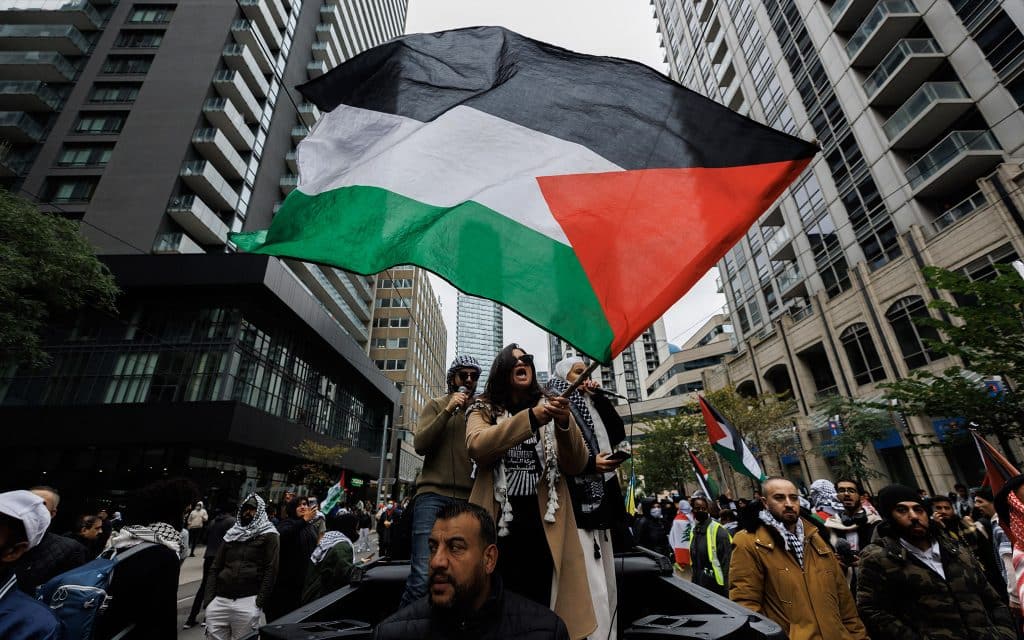
Anti-Israeli demonstrators wave Palestinian flags: Image CBC
But more than any other event, it is the Oct. 7 attack on Israel by Hamas that has exposed Mr. Trudeau’s inability to fight for liberal values. Since that day, the Canadian Jewish community has been subject to violence not seen since the 1930s. A synagogue has been firebombed, a Jewish school shot at, a Jewish hospital targeted by an antisemitic mob, a Jewish-owned bookstore vandalized, a Jewish neighborhood disrupted, a Jewish grocery store lit on fire.
A mob outside a Holocaust Museum in Montreal chanted, “Death to the Jews.” Mr. Trudeau’s response has been pleas for everyone to just get along. “This needs to stop,” he said, referring to the lobbing of a Molotov cocktail at a synagogue. “This is not who we are as Canadians.”
This litany of failures is all the more significant because of Mr. Trudeau’s name. At a moment of crisis for Canadian multiculturalism, he makes a poor contrast with his father. Pierre Trudeau was not just another Canadian politician; he passed the Charter of Rights and Freedoms while establishing Canada’s Constitution as its own and not subject to the British Parliament.
He made no-fault divorce and homosexuality legal. He instituted the official policy of multiculturalism, which made it a matter of law that Canadian citizens were encouraged to practice their religions and maintain their identities.
Pierre Trudeau might have been the most important architect of the liberal Canada, but he was also tough as hell. He famously invoked the Emergency War Measures Act against separatist terrorists in 1970, suspending civil liberties and bringing in the military. When asked by journalists how far he was willing to go, he said, “Just watch me.” Pierre Trudeau knew that the liberal order demands forceful and practical — and occasionally ugly — defense.
His son now seems to believe that telling people to be nice to one another will do. This weakness not only threatens the multicultural society his father founded; it threatens progressive values around the world. For many, Canada seemed a lone candle alight for the values of pluralism and liberalism as they have been extinguished elsewhere in the world.
Justin Trudeau does not have to call an election until 2025. He won elections against the odds before. But time is not on his side. It’s not Pierre Trudeau’s world anymore. It doesn’t much look like Justin Trudeau’s, either.
Source: NY Times
Justin Trudeau Continues to Fail Canadians on Key Issues
Politics
Canada’s Population Explosion Under Trudeau Triggers Housing Shortage
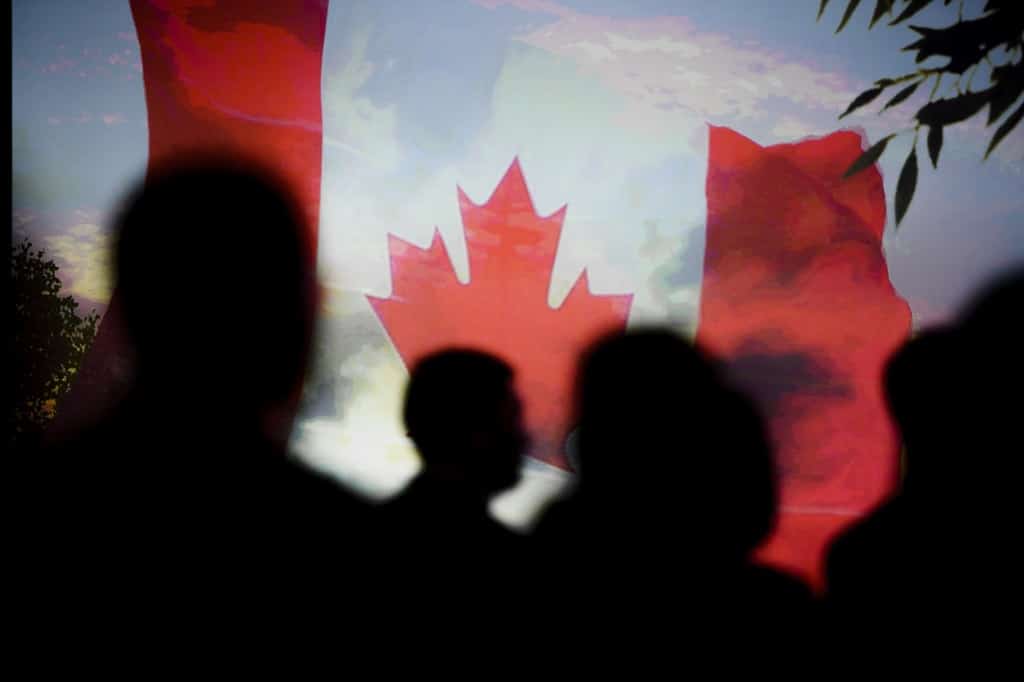
The Trudeau government declared on March 21, 2024, that it would accept fewer temporary residents due to the difficulty of assimilating so many newcomers so quickly. However, population growth appears to be accelerating in 2024.
Statistics Canada’s Labour Force Survey, the population aged 15 and over increased by approximately 411,000 in the first four months of the year, representing a than 50% increase over the four-month growth in early 2023.
This new acceleration was the focus of a recent research paper by Stéfane Marion, chief economist at the National Bank of Canada. “The demographic shock is getting worse in Canada,” he told Canada’s Globe and Mail.
Canada is seeing its strongest population expansion in decades, thanks almost exclusively to foreign migration, which includes the entrance of temporary workers and students. The population increased by about 1.3 million last year, or 3.2%, the fastest rate since the late 1950s.
Every month, tens of thousands of households participate in Statistics Canada’s labour survey. While the government includes population data in its monthly jobs report, they are not official estimates. Statscan publishes a different population report on a quarterly basis; the next edition is due June 19.
Nonetheless, these data indicate that Canada’s economy has remained strong to begin the year, which could complicate the federal government’s efforts to limit migration.
For the first time, the Trudeau government will impose limits on temporary residents beginning this fall. The government aims to reduce this group to 5% of the total population during the next three years; at latest count, they accounted for 6.5%.
Given those plans, “it would seem that many people have decided to come to Canada earlier,” Mr. Marion said, stressing that housing affordability may worsen in the short term.
Several analysts have predicted that Canada’s population growth will eventually decrease to approximately 1% when these new laws take effect.
Housing Affordability in Canada
Meanwhile, Stéfane Marion fears that housing affordability difficulties will increase amid another surge in immigration numbers.
“Demographic shock is worsening in Canada. The working-age population (aged 15 and over) increased by more than 100,000 in April, bringing the total to more than 410,000 after four months in 2024.
According to today’s Hot Chart, this is a significant acceleration (+47%) above the 278,000 increase seen in the first four months of 2023. Greater Toronto, where population growth hit a record 107,000 at the start of the year, has accelerated by 66% compared to 2023.
Greater Montreal and Greater Vancouver have not lagged behind since the beginning of 2024, with growth more than doubling that recorded in 2023.
With Canada’s Minister of Immigration, Refugees, and Citizenship, Marc Miller, announcing plans to curb immigration in 2025, it appears that many people have decided to come to Canada sooner.
Housing affordability issues could increase in the coming quarters, as we approach another record year of population growth.
RBC indicates a loss of affordability in Canada
RBC’s aggregate affordability score for Canada increased by 2.8 percentage points to 62.5% as mortgage rates rose and property prices rose somewhat. (An increase in the measure indicates a loss of affordability.) This reversed a little improvement in the second quarter.
The issue is particularly acute in Vancouver, Victoria, and Toronto, where property ownership is extremely expensive. Ottawa, Montreal, and Halifax also confront difficult affordability issues.
Last quarter, purchasers’ already bad situation deteriorated even further. A typical household required to set aside an additional 4.4 percentage points of its income to afford the costs of owning an average home at current prices and interest rates.
In fact, the entire income of that (median) household was insufficient, with RBC’s aggregate affordability metric coming in at an amazing 102.6%. The only practical choice for most ordinary consumers remains a less expensive condo apartment, which is still out of reach for many.
Home purchase activity has cooled again after unexpectedly rebounding last spring. Furthermore, prices are beginning to fall from their summer highs. In the face of significant affordability pressures, we believe the downward trend may accelerate in the near term.
Keywords: Canada News, Canada Population
Politics
Trudeau Liberals Electoral Chances are as Good as Dead
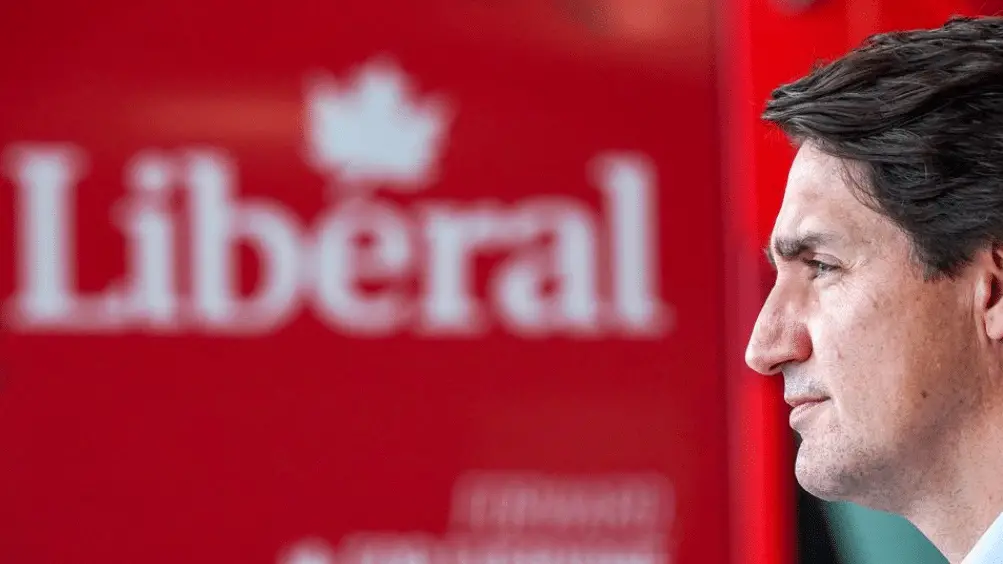
Justin Trudeau’s Liberal Party’s popularity has plummeted to record lows in recent polls. Scandals and his carbon tax weakened Trudeau’s support after years of support. Many election Analysts belive Justin Trudeau and his Liberals will not survive the next election.
The newest Angus Reid survey shows the Conservatives leading nationwide, with Trudeau and his Liberals losing support in most provinces, especially Ontario and Quebec. Analysts say Trudeau’s leadership fatigue, unhappiness over inflation, ridiculous carbon tax, and continual policy flip-flopping are driving voters away.
Trudeau’s carbon tax is unpopular across Canada. Many Canadians hate its higher prices for homes and businesses.
Critics say it unfairly targets energy, threatening jobs and prosperity. Skeptics believe the tax fails to solve global climate challenges despite claims it will reduce emissions.
Provincial governments like Alberta passionately oppose federal intrusion. The carbon tax still divides society.
Steven Guilbeault, Trudeau’s Environment and Climate Change Minister, has lost support from neutral public and provincial governments and the powerful climate action lobby.
Don Braid of the Calgary Herald says Chickens with their heads cut off run around in circles. In politics, the federal Liberals are starting to exhibit this postmortem behaviour.
Environment and Climate Change Minister Steven Guilbeault, the core cabinet fowl who said no new roads should be built in Canada, continues to press his climate extremism.
“The result is political fiasco.”
Alberta and Saskatchewan have always been bitterly opposed to many measures. But Guilbeault is now losing support from the public, provincial governments that once were at least neutral and, crucially, the powerful climate action lobby.
The disasters are self-inflicted. Trudeau and Guilbeault stuck to the carbon tax even after the policy’s disastrous deflation by the “carve out” for home heating oil, a benefit mainly to Atlantic Canada.
Their faux-tough response — nobody else gets that, dammit! — actually cost farmers a break that had been planned, but suddenly looked like another exemption.
The carbon tax, revealed as a purely political tool, is ripe for axing by a potential new leader like Mark Carney. Even New Democrats have argued that the tax should exit, stage left.
Now, Guilbeault has introduced amendments to the Impact Assessment Act, allegedly bringing it into line with the Supreme Court ruling that found the law seriously intrudes on powers rightly belonging to the provinces.
Trudeau’s power grabs shot down
Guilbeault has never acknowledged this was a defeat. He treats the ruling as a simple policy problem rather than a 5-2 thumping by judges not usually known for hostility to federal power grabs.
Alberta was predictably furious about the amendments. Premier Danielle Smith always said Guilbeault would make a gesture and proceed as usual, forcing yet another court challenge.
“When you look at the unconstitutionality of the first draft, you can’t just make tweaks and bring this in line with the Constitution,” says Rebecca Schulz, Alberta’s minister for environment and protected areas.
“That’s really the issue here. Minister Guilbeault still has the ability to involve himself in projects that are within provincial jurisdiction.
“In the end, this piece of legislation remains unconstitutional. We are going to be taking this back to court and I’m confident in our position, because their changes don’t actually address the issues that we’ve raised.”
Trudeau’s middle ground game not working
The Impact Assessment Agency, the powerful regulatory body that oversees all this, said in a statement: “No decisions to designate projects will be taken. Consideration of any new designation requests will only resume, as appropriate, once amended legislation is in force.”
Most striking is the fury from the climate action lobby toward Guilbeault’s amendments.
“Overall, the bill is a complete federal abdication to address proposed high-carbon projects such as in situ oil mines,” Steven Hazell, a retired environment lawyer and federal regulator told the National Observer, Canada’s best chronicler of climate stories and policy.
Green party Leader Elizabeth May said the government was “erring on the side of stupidity.” May sees the court decision as an opportunity to go further with legislation, not retreat to meet demands of provincial jurisdiction.
World
China And Russia Reaffirm Their Close Ties As Moscow Presses Its Offensive In Ukraine
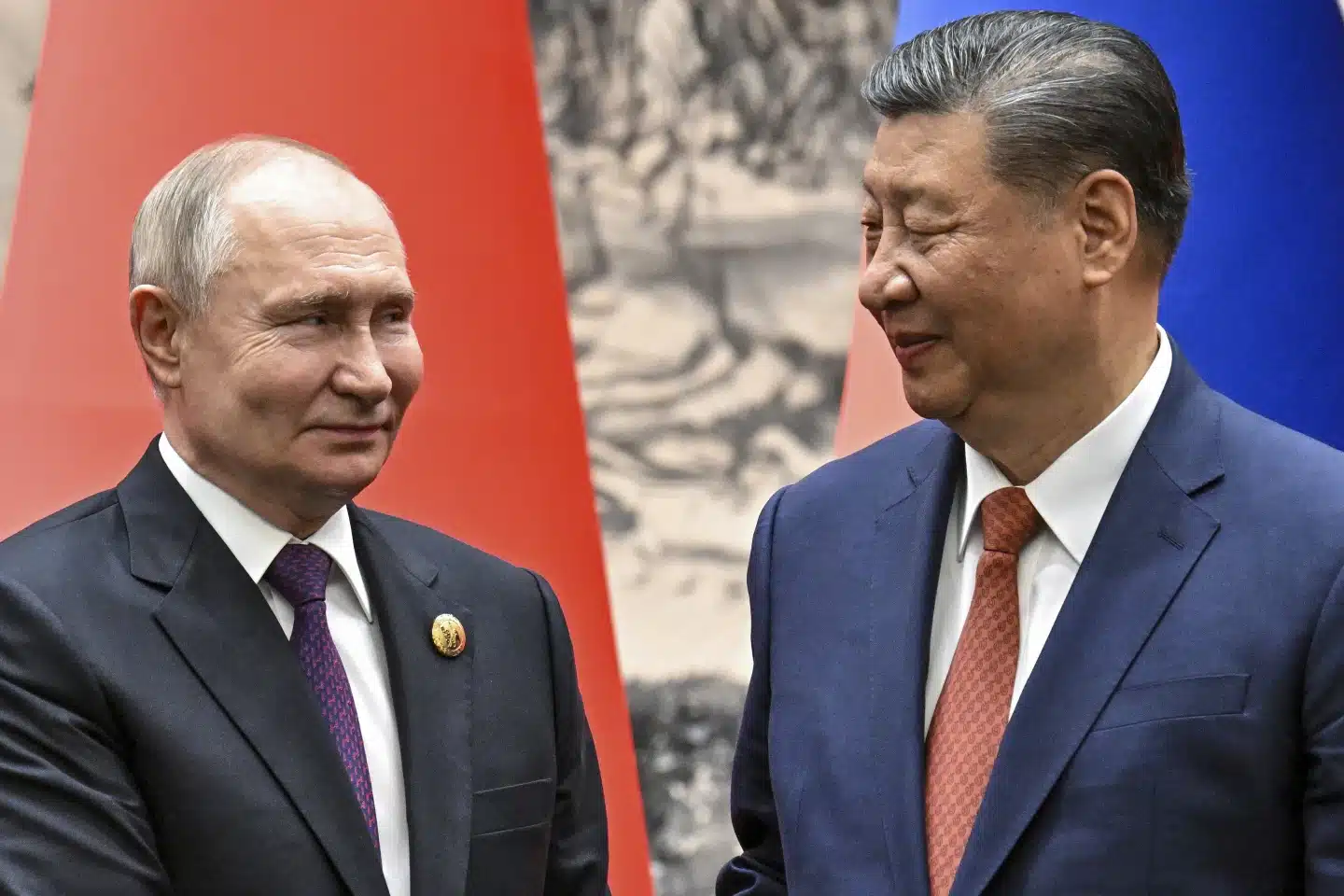
BEIJING — On Thursday, Russian President Vladimir Putin and Chinese President Xi Jinping reiterated their “no-limits” friendship, which has expanded as both countries face mounting tensions with the West, and blasted US military deployments in Asia and the Pacific.
At their summit in Beijing, Putin hailed Xi for China’s recommendations to settle the conflict in Ukraine, which Ukraine and its Western allies have rejected as mostly adopting the Kremlin’s line.
Putin’s two-day state visit to one of his biggest allies and commercial partners comes as Russian forces launch an operation in northeastern Ukraine’s Kharkiv region, marking the most serious border incursion since the full-scale invasion began on February 24, 2022.
China claims to be impartial in the crisis, but it has supported the Kremlin’s accusations that the West led Russia into attacking Ukraine, and it continues to supply vital components required by Moscow for weapons manufacture.
AP – VOR News Image
China And Russia Reaffirm Their Close Ties As Moscow Presses Its Offensive In Ukraine
China, which has not condemned the invasion, suggested a broad-based peace plan in 2023, calling for a cease-fire and direct talks between Moscow and Kyiv. Both Ukraine and the West rejected the idea because it did not call on Russia to vacate Ukraine’s occupied territories.
China also lent a verbal nod to Russia’s narrative about Nazism in Ukraine, with a joint statement issued Thursday saying Moscow and Beijing should protect the post-World War II order and “severely condemn the glorification of or even attempts to revive Nazism and militarism.”
Putin has claimed the “denazification” of Ukraine as a primary purpose of the military action, falsely referring to Ukrainian President Volodymyr Zelenskyy’s government as neo-Nazis.
The mostly symbolic and ceremonial visit emphasized cooperation between two countries facing challenges in their relations with the United States and Europe.
“Both sides want to show that despite what is happening globally, despite the pressure that both sides are facing from the U.S., both sides are not about to turn their backs on each other anytime soon,” said Hoo Tiang Boon, a Chinese foreign policy researcher at Singapore’s Nanyang Technological University.
While Putin and Xi stated they wanted to stop the war, they made no new ideas in their public remarks.
“China hopes for the early return of Europe to peace and stability and will continue to play a constructive role toward this,” Xi said in prepared remarks to the media in Beijing’s Great Hall of the People. His statements echoed China’s overarching peace initiative.
Earlier in the day, Putin was greeted in Tiananmen Square with military fanfare and cannon fire.
On the eve of his visit, Putin stated that China’s proposal may “lay the groundwork for a political and diplomatic process that would take Russia’s security concerns into account and contribute to achieving long-term and sustainable peace.”
Zelenskyy has stated that any negotiations must entail the restoration of Ukraine’s territorial integrity, the departure of Russian soldiers, the release of all captives, a tribunal for those responsible for the assault, and security assurances for Ukraine.
AP – VOR news Image
China And Russia Reaffirm Their Close Ties As Moscow Presses Its Offensive In Ukraine
Putin said he would brief Xi on the situation in Ukraine, adding, “We appreciate the initiative of our Chinese colleagues and friends to regulate the situation.”
Following Russia’s latest attack in Ukraine last week, the war has reached a crucial point as Ukraine’s depleted military awaits new supplies of anti-aircraft missiles and artillery rounds from the United States, which have been delayed for months.
China and Russia’s joint statement also harshly slammed US foreign policy, citing US-formed alliances as having a “Cold War mentality.”
“Both sides expressed serious concern about the consequences caused to the strategic stability of the Asia-Pacific region by AUKUS,” according to the statement, referring to the acronym for Australia, the United Kingdom, and the United States.
China and Russia have accused the United States of installing land-based intermediate-range missile systems in the Asia-Pacific region under the guise of joint drills with allies. They claimed that the United States’ operations in Asia were “changing the balance of power” and “endangering the security of all countries in the region.”
The united declaration underscored China’s support for Russia.
“There’s so much Chinese falling over themselves to give Russia face and respect without saying anything specific, or committing to anything,” said Susan Thornton, a former diplomat and senior fellow at Yale Law School’s Paul Tsai China Center.
The meeting was another endorsement of China and Russia’s amicable “no limits” friendship, which they signed in 2022, just before Moscow invaded Ukraine.
Since then, Russia has been increasingly economically dependent on China since Western sanctions have limited its access to most of the global commercial system. China’s expanding commerce with Russia, which reached $240 billion last year, has helped the country buffer some of the worst effects of sanctions.
Moscow has transferred most of its energy exports to China and relied on Chinese enterprises to purchase high-tech components for Russian defense sectors to avoid Western sanctions.
AP – VOR News Image
China And Russia Reaffirm Their Close Ties As Moscow Presses Its Offensive In Ukraine
“I and President Putin agree we should actively look for convergence points of the interests of both countries, to develop each’s advantages, and deepen integration of interests, realizing each others’ achievements,” added Xi.
Xi congratulated Putin on the start of his fifth term in office and commemorated the 75th anniversary of diplomatic relations between the former Soviet Union and the People’s Republic of China, which were formed after a civil war in 1949. In the March election, Putin eliminated all significant political opponents and faced no serious threat. He, like Xi, has not spelled out a succession strategy.
“In a famous song of that time, 75 years ago — it is still performed today — there is a phrase that has become a catchphrase: ‘Russians and Chinese are brothers forever,'” Putin stated.
During the war, Russia and China expanded their military ties. In recent years, they have conducted several cooperative war simulations, including naval drills and long-range bomber patrols over the Sea of Japan and the East China Sea. Russian and Chinese ground forces have also moved to the other country’s territory to conduct joint training.
China continues to be a major market for Russian military hardware, while the country’s defense industry is rapidly developing, including the production of aircraft carriers and nuclear submarines.
Putin has already stated that Russia has shared highly sensitive military technologies with China, considerably improving its defense strength.
SOURCE -(AP)
-
Sports5 months ago
Saints’ Aggressive Play-Calling Ends Up Coming Back To Hurt Them In Loss To Rams
-
Business5 months ago
Nike Says It Will Cut $2 Billion In Costs In A Major Warning For Consumers
-
Business5 months ago
Federal Court Revives Lawsuit Against Nirvana Over 1991 ‘Nevermind’ Naked Baby Album Cover
-
News5 months ago
The Rise of Woke Ideology in Western Culture
-
Business5 months ago
Wayfair CEO: Employees Need To Work Longer Hours, After Laying Off 5% Off The Company
-
Sports5 months ago
StreamEast Live Sports Streaming: The Ultimate Guide


